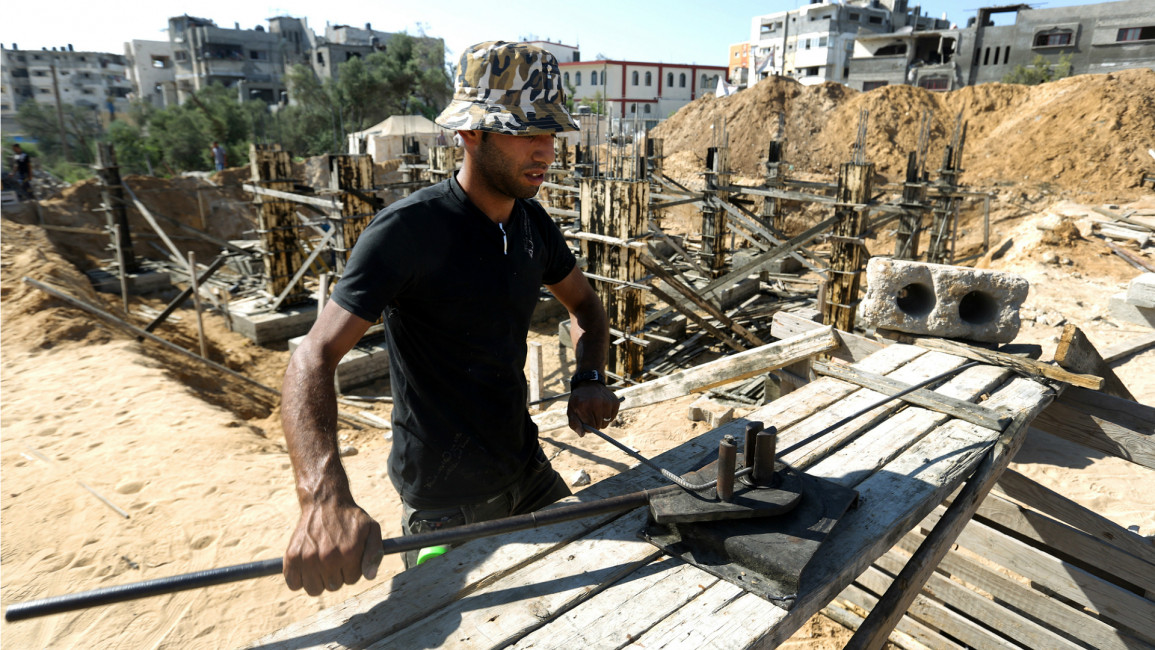First family home rebuilt year after Gaza war
For over a year Atef al-Zaza and his family have been waiting to move back into their Gaza home, flattened like thousands of others in last year's devastating war with Israel.
Now it has become the first in the ravaged coastal strip to be completely rebuilt, just in time for the wet and windy Gaza winter.
The 51-day war in July-August 2014 killed 2,200 Palestinians and destroyed or damaged thousands of homes in the besieged Gaza Strip.
| In 1948 we had to go into exile. During the 2008 and 2013, wars we left our home and in the 2014 war it was destroyed... |
Until now the only repairs had been to buildings which were partially damaged, while the Zaza home - in the particularly hard-hit Shejaiya neighbourhood of Gaza City - was completely obliterated.
Since then, Atef al-Zaza, 49, and the 11 members of his family have stayed with relatives and for a while in a small rented apartment.
Now he proudly shows visitors the brand new, 160 square metre (1,722.23 square foot) house, surrounded by the rubble of neighbours' homes yet to be reconstructed.
"The best day of my life," his wife Fatima says of the move back home, while expressing concern for "his brothers-in-law who are still waiting for a house and for the whole neighbourhood which is destroyed".
In Gaza, violence is never far away and a few hundred metres from the Zaza home young Palestinian stone-throwers clash daily with Israeli soldiers on the other side of the border fence.
Rebuilding could take decades
The UN Relief and Works Agency, tasked with caring for Palestinian refugees who make up 75 percent of the strip's population, says 9,000 of their homes were totally destroyed in the Israeli bombardment and tens of thousands damaged.
Some of those now rebuilding are doing so for the third time, UNRWA spokesman Adnan Abu Hasna said, referring to previous Gaza wars in 2008 and 2012.
The task is fraught with obstacles; the Gaza Strip is subject to blockades by both Israel and Egypt, between which it is sandwiched.
Israel tightly controls the flow of raw materials such as cement and gravel into Gaza, fearing they could be used by Palestinian militants to fortify bunkers and tunnel under the border.
Money is also lacking
"UNRWA has only received about $247 million (225 million euros) when it needs $720 million to rebuild or renovate the 140,000 homes of refugees affected by the war," Abu Hasna said.
Tens of thousands of damaged homes have been fixed, but more than 13,000 refugee families are still homeless, he said.
NGOs estimate that with the supply of materials and funding at present levels, Gaza home reconstruction could take decades, and that is not counting the need to repair or replace infrastructure and hundreds of schools, medical facilities and other public buildings.
'Explosion' on the way
UNRWA has so far won Israeli agreement to allow in enough materials to rebuild the homes of 170 families and sees the completion of the Zaza home and the 169 to come as a small victory.
But in a territory where poverty and unemployment - at 45 percent one of the world's highest jobless rates - are rampant, "despair and anger caused by the delay in construction and the continued blockade will cause an explosion,' Abu Hasna said.
Israel imposed its blockade on Gaza in 2006 after Palestinian Islamist movement Hamas captured an Israeli soldier, and tightened it a year later when Hamas took control of the strip.
Before then, Zaza worked in the Israeli construction industry. Today he is unemployed and needed UNRWA to build his house.
A descendant of refugees, he knows how to temper his happiness at the new family home with caution learned from history, starting with the foundation of Israel in 1948 and the accompanying war in which so many Palestinians became refugees.
"In 1948 we had to go into exile," he said. "During the (2008 and 2013) Gaza wars we left our home and in the third (2014 war) it was destroyed."
"Every minute we say that a new war may break out."



